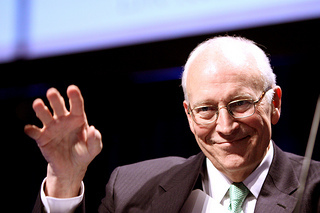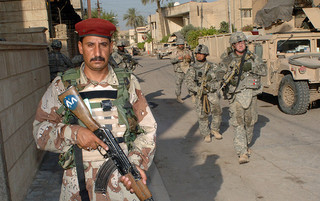Once again President Obama is being sharply criticized by domestic opponents for what Politico calls a 'gaffe' uttered in a press conference in Germany on 8 June 2015:
We don't yet have a complete strategy, because it requires commitments on the part of the Iraqis as well about how recruitment takes place, how that training takes place. And so the details of that are not yet worked out. [Italics added.]
Politico comments:
The gaffe comes at a moment when the White House is trying to push back on a stream of bad news coming out of Iraq, insisting that despite setbacks, the overall story on combating ISIL is one of progress. This hasn't been an easy case for the administration to make.
The President's repeated problem with 'strategy' in Iraq may reflect the fact that "getting the job done" militarily in Iraq is close to impossible.
MIT conventional military forces scholar Barry Posen asserts:
The most important fact revealed by ISIS's victory [in Ramadi] is that the 'Iraqi Army' no longer exists.
If the Iraqi Army has evaporated, or perhaps more accurately deteriorated into a collection of local militias and palace guards, then the U.S. 're-training' mission in Iraq is vastly more difficult than we have been led to believe. Having claimed to build an Iraqi Army, which seems not to exist, and which one doubts ever really existed, the U.S. military is now trying to build another one, from the ground up. Why will things turn out better this time?
Posen concludes his assessment by saying:
The ingredients exist in the region for a loose ring of containment around ISIS. That ring strengthens when ISIS pushes into areas populated by other ethnic or religious groups. The U.S. should buck up these defenders with weapons, money, intelligence, and air strikes, when they are under pressure, but should be under no illusions about their capability to defeat ISIS, re-occupy huge swathes of Iraq, and bring those areas into a cohesive Iraqi political community.
But no one in Washington is ready to endorse containment of ISIS as a strategic objective. Most Republican leaders champion robust American leadership and determined military action to 'defeat' ISIS, while the White House pursues its objective of getting Baghdad to 'step up', create a decent national army and make a way for real political representation and participation by disaffected Sunnis.
The Republican option might require a twenty year reoccupation of Iraq by the US military, trillions of dollars of new commitments, and thousands of American lives. The Democratic White House plan is almost surely 'too little, too late' with an Iraqi 'partner' who isn't really a partner.
As Loren Thompson points out in his recent Forbes column "Failed State: Five Reasons Iraq Can't Be Fixed":
Iraq had no organic national identity at its inception, and the repressive steps Sunni autocrats took over the years to enforce their authority left the country ripe for dissolution when America invaded in 2003. The U.S. found itself defending a state for which the vast majority of citizens felt no real sense of loyalty.
The one thing that should be clear to everybody is that the ethnic and sectarian cauldron that Iraq has become today does not have a future. Making its preservation the centerpiece of American policy in the region is a prescription for defeat.
Meanwhile Washington is upping its training and air interdiction campaign in Iraq. On June 9th President Obama authorized 450 more troops to deploy to Taqaddum, just south of Ramadi. Brett McGurk, deputy assistant secretary of state for Iraq, told reporters:
Given the strategic location of Taqaddum, I think this will greatly improve our ability to turn around airstrikes in a pretty fast clip when we are directly advising and assisting Iraqi units in those areas and also the associated tribal fighters who will be with them...
US troop presence in Iraq has risen from a couple hundred a year ago to 3,550 this month. There may be an equal number of private contractors there as well.
To what ultimate end is this new American warfighting in Iraq intended? An increasingly good question.
There is little or no credibility in the notion that the Iraqi government is going to be able to win over the loyalty of Sunni tribes or create a national army capable of taking back and holding territory lost to ISIS. Nor is it any longer credible that degradation and containment of ISIS will be followed by a political process yielding a federated Iraq that can satisfy the claims of Shia, Sunni and Kurdish communities for self-government and a fair share of the national petromony through some distributive mechanism or by way of quality public goods available to all.

photo credit: Jeb Bush announces his presidential run via photopin (license)
This brings us to Jeb Bush trying to place blame for this mess on President Obama. Yes, Obama should have probably leaned hard on Baghdad to share power with Sunni communities and to put more national effort into creating a capable army with loyal participation from all communities.

photo credit: Dick Cheney via photopin (license)
The rise of ISIS finds its genesis in decisions made by the Cheney-Rumsfeld team in brother George's administration in 2003. At least three extraordinarily stupid decisions of the Bush administration are responsible for setting Iraq on the path for dissolution and violent inter-communal conflict which continues more than ten years later:
•Rumsfeld refused to send sufficient American ground troops to rapidly occupy Iraqi military bases and depots or to enforce an orderly disarmament of Iraqi troops.
•No one bothered to negotiate pensioning off top Iraqi military leaders if they cooperated in mustering and disarming the troops under their command and swore their allegiance to a new government (basically standard procedure for the victorious dealing with a defeated army.)
•Instead the head of the Coalition Provisional Authority Paul Bremer in May of 2003 issued two orders: #1 banning members of the Baath Party from government work and #2 disbanding the Iraqi military.
Deep de-Baathification had the effect of abruptly throwing 85,000 Iraqis out of the middle-class, essentially guaranteeing that they would become members of an aggrieved opposition to the new government. Dissolving the security forces of Iraq left 720,000 armed men unemployed. As James Pfiffner has written about "US Blunders in Iraq":
...many officers in the Army were professional soldiers, and the rank and file enlisted solders constituted a source of stability and order. The disbanding threw hundreds of thousands out of work and immediately created a large pool of unemployed and armed men who felt humiliated and hostile to the US occupiers. According to one US officer in Baghdad, "When they disbanded the military, and announced we were occupiers - that was it. Every moderate, every person that had leaned toward us, was furious."
Sorry, Washington -- you probably can't put Iraq back together again. Certainly, the kinetic effects of more bombing won't repair the damage done to the Iraqi nation since the US invaded in 2003.

